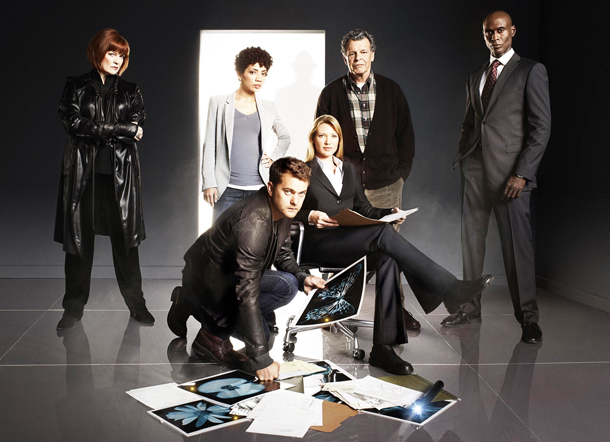
This weekend witnesses the end of an era. The final ever episode of Fringe airs in the US and around the world (on Sky here in the UK). Who’d have though five years ago that a show that launched looking like X-Files-lite would end up being one of the greatest telefantasy events in history?
To celebrate the moment here’s an interview with current Fringe showrunner JH Wyman which originally appeared exclusively in the SFX A-Z Of Sci-Fi TV (which is still on sale, but only for another couple of weeks). Wyman looks back at each year on the show and his contributions to each of them.
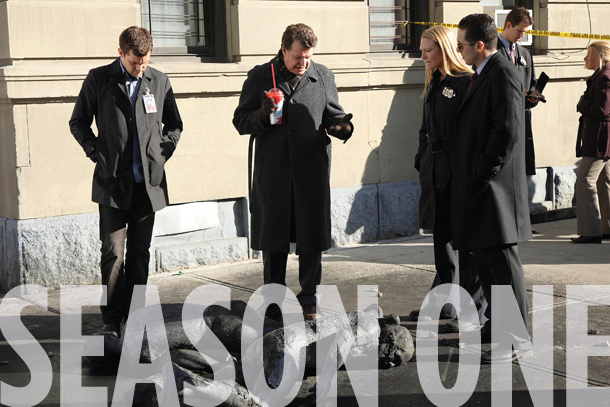
SEASON ONE
Wyman was asked to join Fringe around episode 1.14 (“Ability”) “JJ Abrams had asked if I’d come in and help because they hadn’t found the show yet. It was sort of stuck between this really awesome pilot, and, ‘Where do we go from here?’ It had procedural elements so was it an X-Files clone? What was it about? Basically, I said to them, ‘I love science fiction but I haven’t written a lot of it’. I adore it, of course, but JJ said it was really about a family and not to worry because I’d love it. Ultimately, I realised the better the science fiction, the more about humanity it was. Once I realised that, I was like, ‘Okay, I can do a million
of these. I love this!’
“I think we started to find the show at the end of the first season. Everybody started to think in different directions, but ultimately it came down to executive producer Bryan Burk – a little known fact! We were sitting around and I was coming up with the concept that there’s more than one of everything and the idea of a coin. There would be two coins: one for Over Here and one for Over There. Bryan blurted out in the writer’s room, ‘We have to show the hatch!’ It was brilliant because it was true. We were covering the ball so much and nobody was compelled. The audience didn’t know what was going on, or where the show was going. So once we let the cat out of the bag – that Peter is from another place and Walter is hiding a terrible secret – the show began to take purchase. It was a defining moment.”
Next page for season two
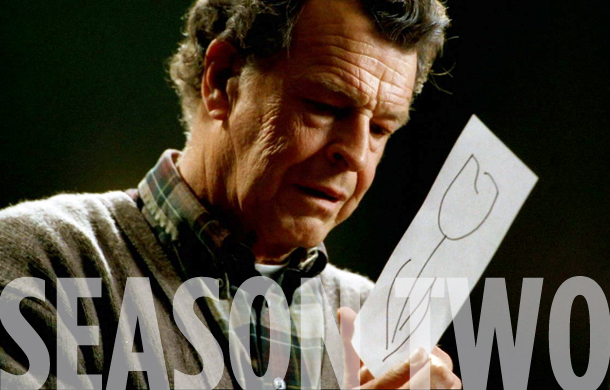
SEASON TWO
With the idea of the parallel universe established, the second year brought Peter’s unconventional backstory to the fore
“We were still firing in the dark to try to figure out the best way to tell the stories. We would hit and miss, hit and miss; some would be better than others. We learned a lot of lessons. Ultimately the ‘mythalone’ didn’t come into play until ‘White Tulip’ and that, to me, was a massive moment of enlightenment – it seems like such an easy answer when you’re looking back at it. ‘Duh, Joel! How about you tell a great story people are compelled by, but then you also give the hardcore fans something to stick with?’
“You get a lot of pressure from the networks to do standalones because they want more people to come to the table. Therein lies the conundrum, because I never want to leave the show’s fans frustrated but we have a master we have to please as well. It was really tricky. However, in season two, what was really cool was that we were trying out a whole bunch of different paradigms. One week might be a horror episode, the next week would have an alien feel… it gave us a lot of gasoline for a while but, bit by bit, the really important stuff starts to become clear: Peter, Peter’s relationship with Walter, Walter’s relationship with the team, Walter’s secret, Peter’s understanding of the secret and his position in the world, then Olivia and her powers. All these things started to gain the importance that they probably should have had a lot earlier.
Get sneak previews, exclusive competitions and details of special events each month!
“By the middle of the second season it became clear that I’m writing Fringe for a very specific reason. What I’m always trying to say is that life is guided by the connections that you make and that’s my own personal message, that connection is king.”
Next page for season three
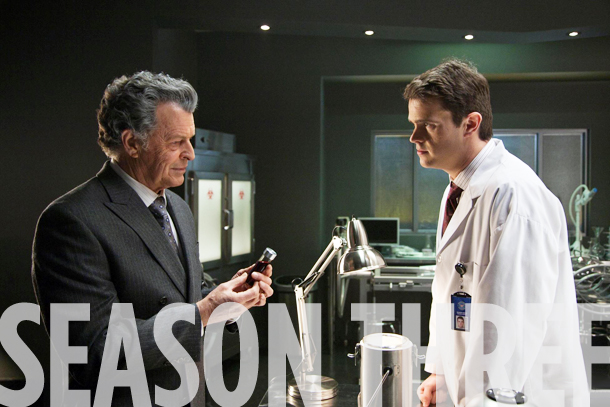
SEASON THREE
Ready to embrace a risky universe-hopping storyline, Wyman says pitching season three to the paymasters at Fox was tough.
“When [co-showrunner] Jeff Pinkner and I realised where we wanted to go, I felt 100% confident that there was no way, honestly and sincerely, that I could feel good about telling a story with an alternate universe without giving the audience a perspective of what was really going on there – if we didn’t, I felt the audience would get short shrift and it would be a bit lame.
“I was very, very invested in creating characters on the other side because, thematically for me, the life and choices we make are so important as to how we tell the story. I was really interested in saying that you can change your life – you’re like four choices away from a completely different existence. It’s a positive message. Fortunately, we had a lot of positive fan response after going over to see William Bell [in season two]. We could point to that and say, ‘We think people are really interested’. Everybody was a little nervous but once they decided to go with it, they never looked back. So that’s how we ended up going Over There. Of course, everybody started to fall in love with the alt characters and then the irony was when we shut the door everybody went, ‘WHAT?!’”
Next page for season four
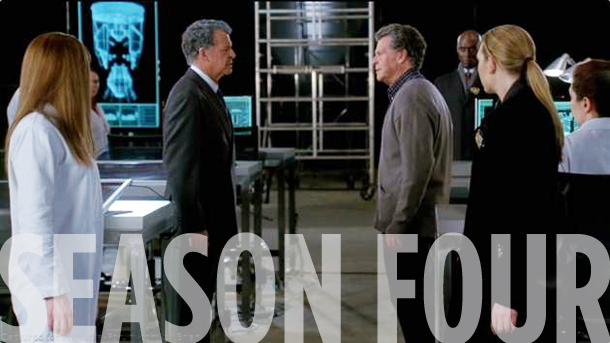
SEASON FOUR
Season four began with one of the lead characters, Peter Bishop, erased from history by “The Machine”
“Once we started on season four, we didn’t jump off the track at all. The disappearance of Peter is going to be very important when it came to the end of the show, and you’re going to understand what September’s trepidations were – why Peter’s so important and all these other great things. You’ll go back and say, ‘Oh, I get it’.
“We were always talking about a coming war. What was appealing to us wasn’t a ‘war’, because how boring is that? It needed to be a much more diversified idea of what war is, what it means and what we’re fighting for. At the end of season four, and especially when ‘Letters Of Transit’ was conceived, it was very clear we are fighting for our humanity, which is really interesting. We really loved the idea that the Observers seemed like really interesting, good people. But you had 12 scientists who came down to take various samples and ideas from our humanity. September fell in love with his charges and the people that we are in this stage of evolution. It was very clear then that the 12 were going to go back and report their findings but they didn’t understand what they were doing. Once the plan became clear, it was too late. It’s funny because a lot of fans now say, ‘I thought the Observers were good guys!’ Well, some of them! Not all Germans were Nazis.”
Next page for season five
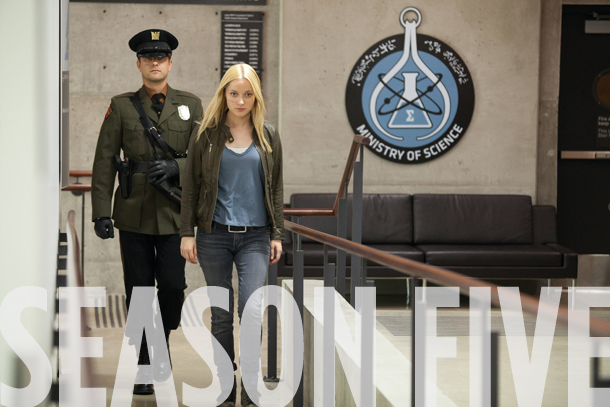
SEASON FIVE
Wyman says season five got picked up on the strength of season four flashforward episode “Letters Of Transit” and a pitch presentation he put together with everyone from the show to persuade the network to let them end their story.
“It was a risk and a gamble but… once we got it, the real thinking began. I had to decide what’s important to answer and what’s not. It came down to the following: I’m a huge fan of television myself and I’d want a number of things from a series I’d invested five years of my life in. I’d want my characters to evolve and go on odysseys. I’d want logical conclusions that make sense and move me. Most importantly, I’d want it to finish in a way so that when it’s over, the next day, if I was a viewer and I took a shower, had breakfast and drove to work, I’d feel good because I’d know where my characters are. I don’t need to know exactly what they’re doing but I’d sense that everything happened the way it needed to happen and I could imagine them in their lives. I’d feel okay about the separation – it was beautiful what I experienced, and wow, that was something.
“So that was a moment of clarity for me. Once I’d decided what I’d expect it was very easy – I was going to tell three odysseys: Olivia’s, Peter’s and Walter’s. And to go through in these last 13 episodes and really nail the theme – what I’ve always been writing about – which is that it’s so difficult to keep a family together in this day and age. It’s so difficult, at times, to look at this terrible world and find beauty. It’s so difficult to keep hope. I wanted to make sure that was the message: connection is hard but it’s worth it. The show for me has always been a metaphor for the struggles of life.”
SFX Magazine is the world's number one sci-fi, fantasy, and horror magazine published by Future PLC. Established in 1995, SFX Magazine prides itself on writing for its fans, welcoming geeks, collectors, and aficionados into its readership for over 25 years. Covering films, TV shows, books, comics, games, merch, and more, SFX Magazine is published every month. If you love it, chances are we do too and you'll find it in SFX.


